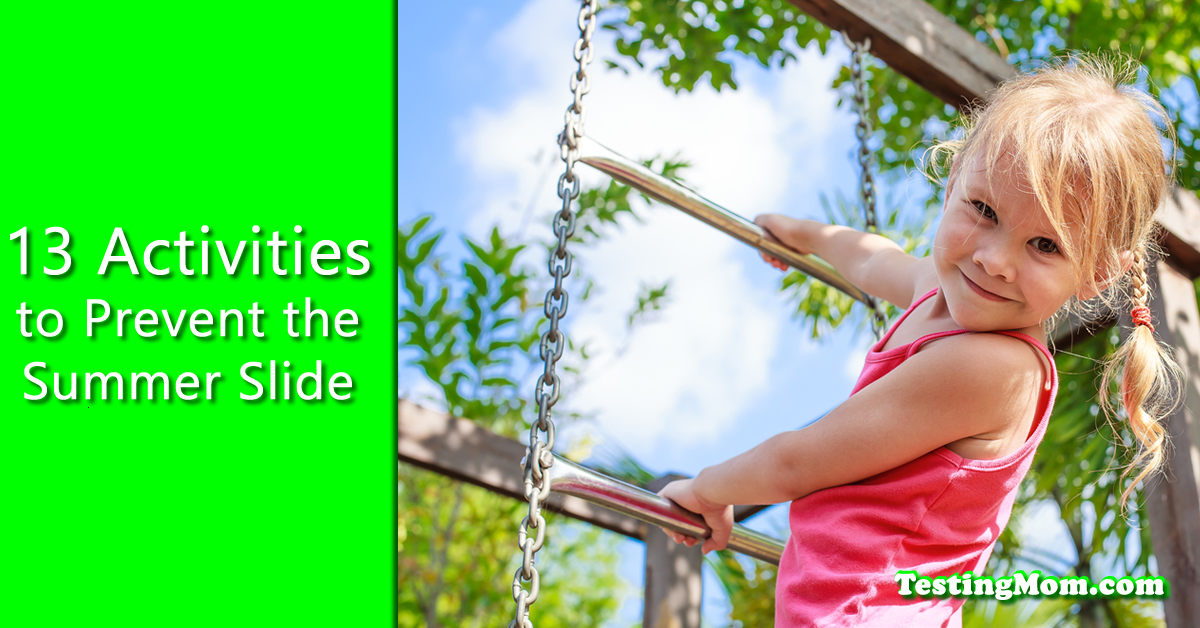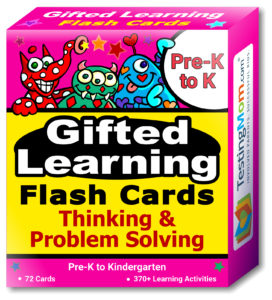› 13 Activities to Prevent Summer Slide
13 Activities to Prevent Summer Slide
posted by Karen Quinn, The Testing Mom - June 13th, 2019
Aware and Prepared
Parents are all aware of brain drain and want to prevent summer slide. “Research over 100 years has shown us – students not engaged in some kind of educational activity over the summertime typically loses about one to three months of learning. And the decline is more detrimental for math than it is for reading.
As parents, we can ALL be intentional to include activities that will not only prevent the summer slide, but promote the idea that learning is FUN!
13 Activities to Prevent the Summer Slide
1. Practice in Advance – Make it FUN!
Practice Model Test Questions – Do 20 – 30 minutes of TestingMom practice questions every day. Even if you know your child is taking one test – The OLSAT for example – do practice questions from all the different tests. They are designed to strengthen the underlying abilities kids need for school – Language, Information, Memory, Fine Motor, Visual-Spatial, Math and Thinking.
2. Books, books, and MORE books!
Keep lots of books around and visit the library! Establish a 30-minute reading time at home every day – whether your child reads for herself or you read to her, make that a tradition! Let your child pick the book – even if it’s a comic book or a book about baseball statistics – whatever interests your child!
3. Read Alouds
Start a long chapter book that you read to your child that he or she will love – such as Little House on the Prairie or The Wizard of Oz or the Fudge series. This teaches language, vocabulary, a love of reading, and patience and self-control as kids have to wait for the next installment.
4. Word of the Day
Create a Word of the Day – Put it on a daily calendar that you turn over each day. Or put words in a jar and let your child pull one out every day. Then put it on the fridge. Make it a word your child doesn’t know and teach her how to use it. Make it a game that everyone in the family will use the word each day. For word ideas, Scholastic has a workbook series – 240 Vocabulary Words that 3rd, 4th, 5th graders should know – and they give them hard words that they might not have learned yet.
5. Fun Websites
Let your child play on some of the fun math or reading websites – Though you want to limited your child’s screen and computer time, when you do let your child use the computer, put them on a fun math website like mathplayground.com or www.mathhoops.com. Also check out PBSKids.org and Readingkingdom.com.
6. Brainquest Decks
Brainquest decks and workbooks – kids love these. Also Highlights magazines are great!
7. Special Board Games
Get a Few Special Board Games For the Summer and Teach Your Child to Play – These teach children strategy, math, fine motor skills and all sorts of other things they need for school and they don’t feel like they are learning. IQ FUN Park 2nd edition was just completed. com
8. Math Activities
Do Math Building Activities that are Fun with your child – Bake together, Let your child have a lemonade stand, play store. Take your child on errands with you and do everyday math problems – Let him pay the cashier and count the change, have him decide which is the most expensive bread and whether or not you should buy it – that sort of thing.
9. Writing Activities
Do Writing Activities at home with your child – Let her write the grocery list before you go. Encourage her to write a thank you letter to her grandparents or get her a pen pal.
10. Summer Research Project
Is there something that really fascinates your child? How can you create a summer research project around it? Let’s say your daughter is fascinated by ancient Egypt. Is there a museum exhibit you could go to where there are mummies? Are there books she can read herself about that? Is there a book you can read to her that is a fictionalized account of life in ancient Egypt or a biography of King Tut? Make it a point to help your child learn more about her subject of passion and to document what she learns through something she writes or an art project.
11. Family Field Trips
Take Family Field Trips to Cool Places Near Your Home – Take pictures at each place you go. When you get home, have your child talk about your experience at the place you went with someone who wasn’t there. Let your child create a photo album of each adventure. This builds his memory skills, organizational skills, and writing skills as he labels each picture. If he isn’t writing yet, you can label the pictures for him.
12. Hire a Tutor.
Consider using a tutor or workbooks if your child is having trouble in math or early reading. How will you help him catch up over the summer?
13. Play Outside!
Let your child play outside – Free, unstructured play is important in building all the abilities kids need to be successful in school and in life. Creativity, self confidence, team work, negotiation, and more.
FUN that is also TEACHING is a WIN-WIN!
All of these things will help your child with testing even though they may seem unstructured and not focused specifically on test questions. They will build your child’s vocabulary, strengthen their thinking skills, build their memory muscle, enhance their visual-spatial skills – everything they need to do well when tested and when in school.





Tell us about your experiences